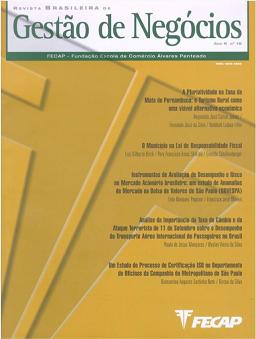Abstract
The terrorists’ attacks using commercial aircrafts as mass destruction instruments in North American soil on 09/11/2001 caused great political and social-economic changes all over the world, bringing about a great deal of influence to several Brazilian economic sectors even nowadays. Common sense points out that this event made the crisis faced by airspace Brazilian industry since 1999 even worse, due to exchange dollar rate fluctuations. Through a population average comparison parametric test and using Pearson linear co relational coefficient, this work aims to demonstrate September 11th event and dollar exchange rate real influence over International Travels Expenses Account in Brazilian Balance of Payment and airborne passengers stream to USA before and after the terrorists attacks. The outcomes from statistics data reject null hypothesis of averages equality between international travels expenses and averages equality between boarded passengers to USA, before and after the event, with 95% trust level. By other hand, the Pearson linear co relational coefficient between dollar exchange rate and international travels expenses was 77, 83%, being significant in 5%.
Key-words: Airborne transportation sector. Event study. Linear cor relational.
If a paper is approved for publication, its copyright has to be transferred by the author(s) to the Review of Business Management – RBGN.
Accordingly, authors are REQUIRED to send RBGN a duly completed and signed Copyright Transfer Form. Please refer to the following template: [Copyright Transfer]
The conditions set out by the Copyright Transfer Form state that the Review of Business Management – RBGN owns, free of charge and permanently, the copyright of the papers it publishes. Although the authors are required to sign the Copyright Transfer Form, RBGN allows authors to hold and use their own copyright without restrictions.
The texts published by RBGN are the sole responsibility of their authors.
The review has adopted the CC-BY Creative Commons Attribution 4.0 allowing redistribution and reuse of papers on condition that the authorship is properly credited.

